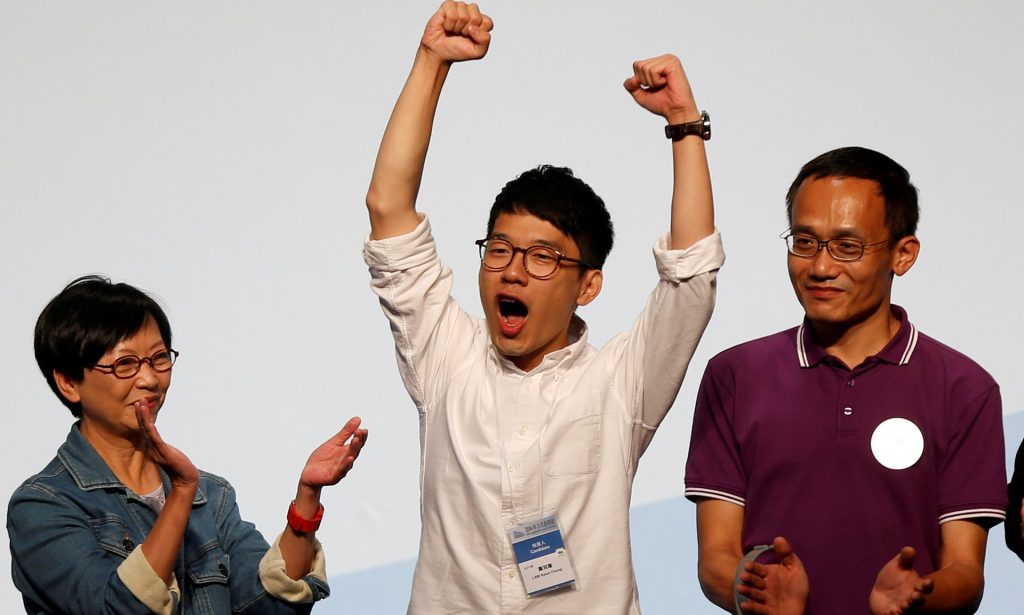
Photograph: Bobby Yip/Reuters
Two years after tens of thousands of young people poured onto the streets of Hong Kong to issue an unprecedented call for political change, a new generation of pro-democracy activists has gained a foothold in power in the former British colony.
At least four radical young activists who support greater political autonomy or outright independence from China claimed seats in Hong Kong’s 70-member Legislative Council, or Legco, after a record 2.2 million people went to the polls on Sunday.
Those elected include Nathan Law, a 23-year-old from the recently founded Demosisto party who was one of the leaders of the 2014 so-called umbrella movement protests.
“I think it is a miracle,” the former student leader, whose party has called for a referendum on independence, told reporters after his victory.
“This is absolutely unexpected – nobody imagined this would happen. Every day and night, our team used hard work and sweat to turn defeat into victory,” he added.
Law will be joined in Legco by Yau Wai-ching, a 25-year-old from a recently founded political party called Youngspiration, who received 20,643 votes.
Sixtus “Baggio” Leung, a 30-year-old from the same party who backs Hong Kong’s independence from mainland China, also appeared poised to be elected on Monday lunchtime.
“We are losing our freedom,” Leung told the Guardian in a recent interview.
He claimed that a growing number of young people now wanted Hong Kong to break away from China after 2047, when the 50-year “one country, two systems” model under which it has been ruled since returning to Chinese control in 1997 expires.
Cheng Chung-tai, a 32-year-old academic from the Civic Passion party, was also elected.
Sonny Shiu-Hing Lo, the author of Hong Kong’s Indigenous Democracy, said a new chapter was opening in the former colony’s politics as young and often more radical protest leaders replaced older members of the mainstream pro-democracy movement.
“This election really represents a generational change in the pro-democracy movement,” said Lo, who is a professor at the Hong Kong Institute of Education.
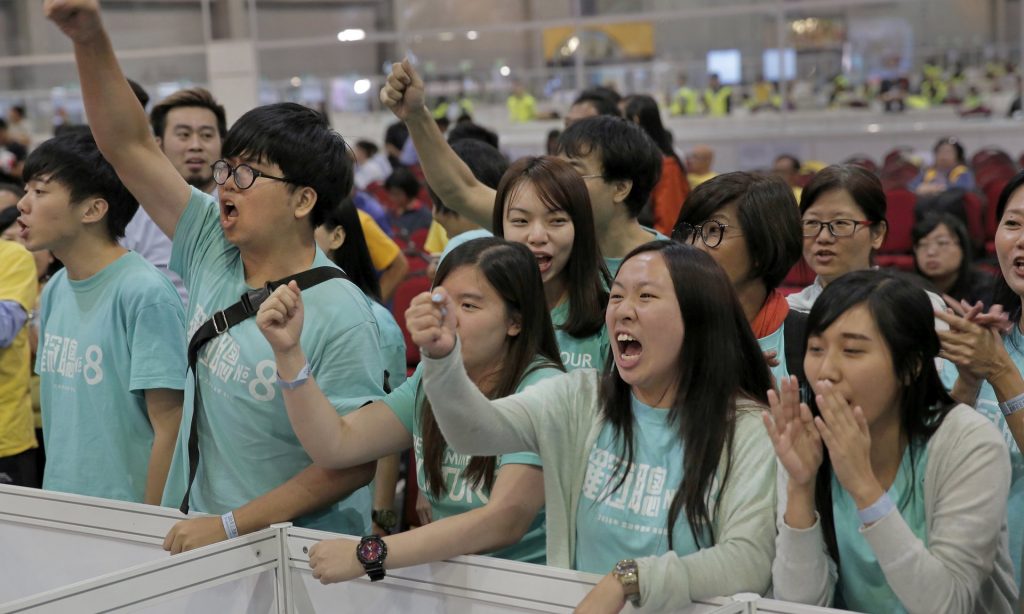
Photograph: Vincent Yu/AP
Politics in the semi-autonomous city would become “more exciting” as such voices replaced more moderate members of the democratic movement as lawmakers, Lo predicted.
“Not only will the strategy of this new generation be new, but their ideas will also be new. So we expect Beijing to have some headaches. Beijing cannot assume it can adopt its old strategies like co-optation to deal with this new generation of democrat inside the legislature and also outside.”
Jason Ng, the author of Umbrellas in Bloom, a book about Hong Kong’s protest generation, predicted political fireworks as highly politicised youngsters picked up the mantle from traditional mainstream democracy figures, known as the pan-democrats.
“Whether the pan-dems like it or not, a generational handover is underway,” Ng said. “The voters have spoken.”
The old guard of Hong Kong’s pro-democracy movement, who have spent decades battling for expanded political rights, has reacted nervously to the rise of this new, often less compromising and more confrontational generation.
Many of the emerging democratic figures cut their teeth during the 79-day umbrella movement protests and say they are now convinced that only radical steps, such as independence or self determination, will secure the political concessions they seek.
“I do feel worried,” Democratic party heavyweight Albert Ho told the Guardian on the eve of Sunday’s election. “The moderate democrats are in a very difficult position.”
Ho said he understood many of the frustrations of this younger generation of so-called “localists”.
“They feel that they are being deprived of a citizens’ right to choose…. And they have a strong dislike of this authoritarian regime in China,” he said.
But the veteran lawmaker said he feared Hong Kong’s democratic camp would be fragmented and weakened by the emergence of a more radical younger generation of candidates.
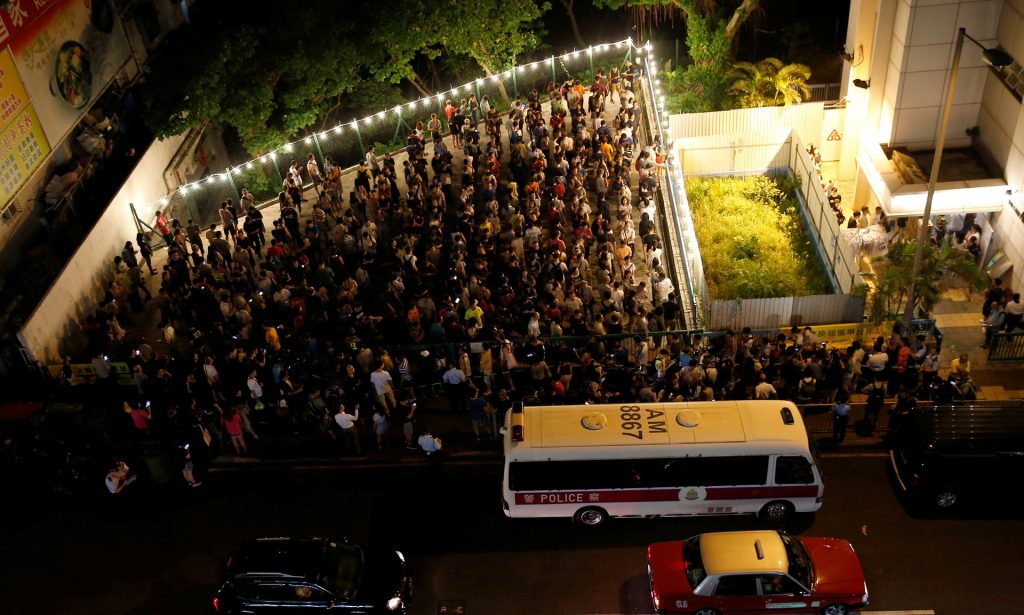
Photograph: Tyrone Siu/Reuters
Ho said he was also concerned that growing talk of independence among some such candidates would result in a backlash from Beijing.
“Of course when you are talking about independence, that makes the people in Beijing, in Zhongnanhai [the Chinese leadership compound] feel very angry. It touches on a raw nerve and they may have a strong reaction to it,” he said.
Emily Lau, another Democratic party veteran, blamed Beijing’s meddling in the former colony’s affairs for stoking growing calls for independence among young Hong Kongers. “It’s a very, very gloomy picture,” she said.
Lo, the academic, said he did not expect the older, mainstream generation of democrats such as Ho, Martin Lee and Emily Lau to “fade away completely in the political area” having stepped down from Legco and predicted they would continue to serve as key intermediaries between the pro-democracy camp and the government.
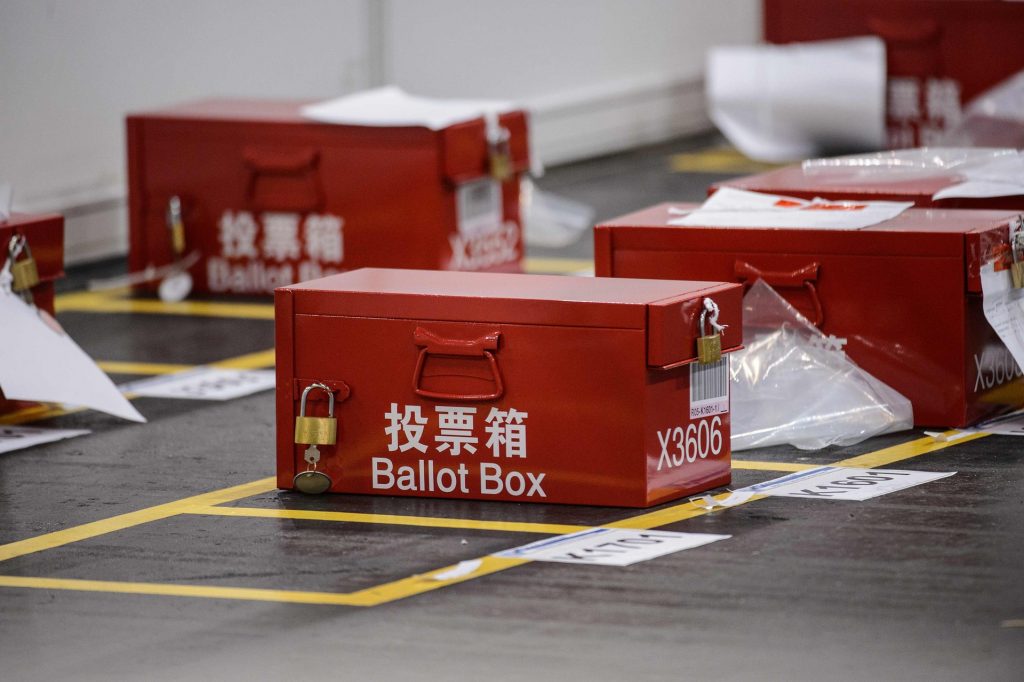
Photograph: Anthony Wallace/AFP/Getty Images
The new generation of lawmakers would show themselves “to be quite hard-line and tough” when they take up their Legco seats on 1 October, he added.
Speaking to reporters on Monday afternoon, Nathan Law said the new generation had the necessary qualifications to wield real political power.
“Many people think being young means being immature, and young people cannot enter politics. A few weeks ago people questioned me about this. But if you look at my performance in election forums and my policy agenda, it shows that if a young person has the ability, they can still be a good legislative council member.”
“The road ahead will be difficult, but a lot of people will be walking with us,” he added.
At some polling stations there were long queues until until 2:30am on Monday morning – four hours later than the scheduled cut-off time – with a turnout of almost 60% of 3.7 million voters. That compares with 53% in the last LegCo elections in 2012.
“There was a record-breaking amount of people casting their ballots this year,” Electoral Affairs Commission chairman Barnabus Fung told reporters on Monday.
It is almost impossible for the democracy camp to take a majority in Legco as 30 of its 70 seats are elected by special interest groups representing a range of businesses and social sectors. Those seats go predominantly to pro-Beijing candidates.
Only 40 seats are directly elected by the public.
Fears that Hong Kong’s freedoms are disappearing were fanned after five city booksellers known for salacious titles about Beijing politicians disappeared, resurfacing in detention on the mainland.
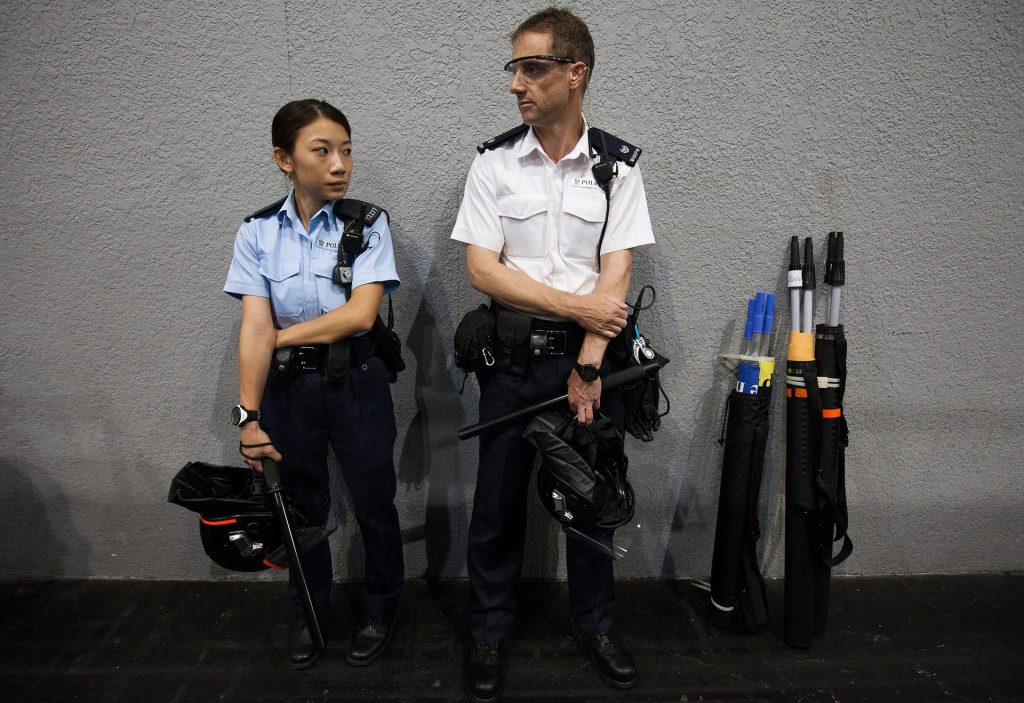
Photograph: Alex Hofford/EPA

